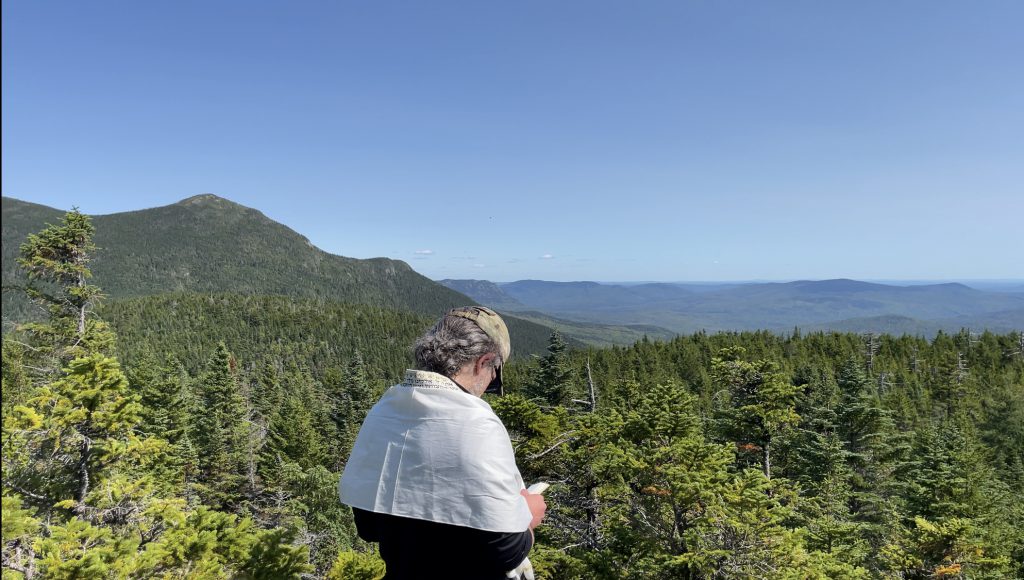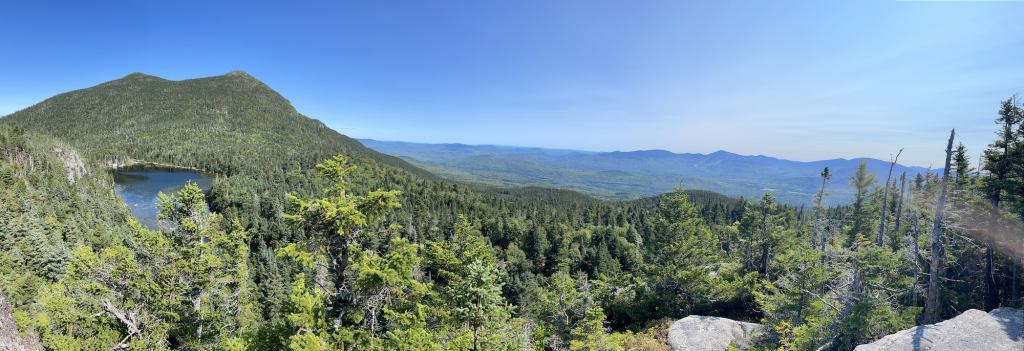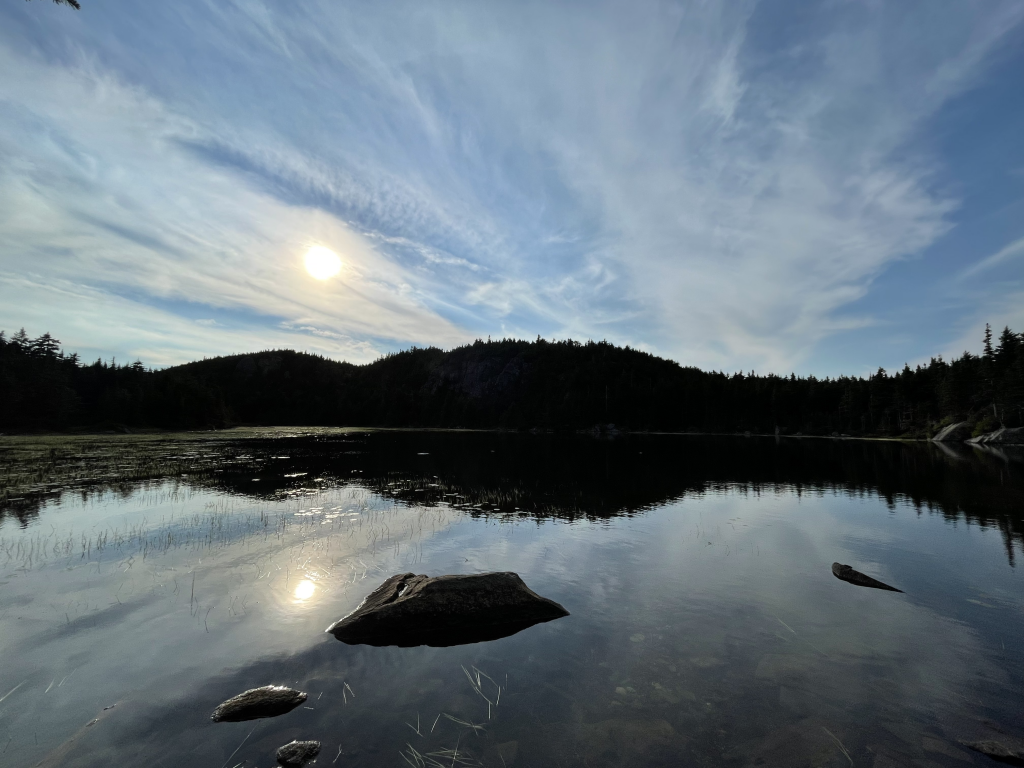A Synagogue President Reflects on the Appalachian Trail
The sun finally set on The Horns Pond in the Bigelow Range. I returned to my campsite, with my hammock strung between two sturdy trees, and retrieved a small sandwich bag. Inside was a small portion of a havdalah candle, a couple of cinnamon sticks, and a small bottle with the requisite amount of Manishchewitz.
In November, I’ll likely be entering my third year as president of Maine’s oldest continuously operating congregation. We’re one of only two synagogues in the state affiliated with the United Synagogue of Conservative Judaism.
These last two years have been hard work. Our previous president left me with an unfulfilled strategic plan and a looming renovation to our social hall. We discovered a possible budget shortfall, and then the pandemic hit. To top it off, in spite of an extensive leadership resume—26 years in the military, an MBA and business leadership background, not to mention several years as Vice President and board member of a larger synagogue in Pennsylvania—there’s a difficulty admitting that I was well-suited for the role. We’ve had imbroglios over gifts, dramatic resignations from the board, deaths we couldn’t properly honor, and of course, everything in orbit around COVID-19. And while at times I feel like a Welsh sin-eater and not so much a functional leader, I do enjoy the role, because I care so much about my community.
Throughout Elul this year, I davened the requisite liturgy. I did selichot. I blew my shofar. It’s a far cry from when I was a ba’al t’shuvah waving a chicken around my head. Back then, I was just trying to find Jewish authenticity. Today, I’m trying to find true communion with the Divine, and it is elusive. My “Jewish headspace” has been fully consumed by my role.
I search for that communion in a place where I always find it: on the Appalachian Trail.
I’m a year out from having left the military, and I’m acutely aware that I’m out of shape. The climb up the Bigelows on the Appalachian Trail off of the Maine Route 16 Trailhead is, for me, brutal. It’s not the hardest hike I’ve ever done, but right now, as I feel the loss of 26 years of muscle tone, it’s not the easiest, either.

Through the trees, as I hike, I catch glimpses of Sugarloaf, and on the north side of the range, Flagstaff Lake.
I davened shacharit at my campsite in the morning, and davened mincha atop a smaller peak overlooking The Horns, all the while being buffeted by the winds. It’s the first time in a while that I’ve truly felt in touch with the Divine.
It hasn’t happened for me this year in shul.
Are you vaccinated? Where is your mask? How many people can we safely accommodate in the sanctuary? What about breakthrough cases?
I am occasionally asked by our gabbaim to conduct the Torah service or Musaf, since I’m familiar with the liturgy. That’s a moment when I sort of feel close to the Divine. I’m merely competent. My Hebrew is functional, but I get performance anxiety, and I’m certainly not the practiced service leader our rabbi is.
On top of a high Maine peak, however, it’s just my voice against the wind, and the wind wins. I ask for healing for my friends and loved ones who are ill. I ask for all the things we ask for in Shemoneh Esrei, and I mostly mean it. I think God hears. I hope God hears. I can’t hear myself.

Sometimes I envy people who say they hear the voice of God. Most of the time, I’m suspicious of their mental health or their honesty. On this day, face into the wind, looking across the breadth of Maine’s mountains, I’m wishing I could hear even a whisper in return.
The beauty and serenity does make me feel in communion with a Creator, albeit in a unidirectional, appreciative sense. Our illogical value we place on the aesthetic is one of the characteristics that is to me evidence of our intelligent design. We are not taught that a view is “breathtaking.” We innately know that when we look up on an incredible vista, that it is “good.” I cannot understand the evolutionary advantage in such an adaptation, not when we are so ill-informed by such an instinct that we still poison our living world.
I stand on the precipice overlooking the valley below. I manage to put out of my brain all of the sour thoughts about the past two years, and just think about the exertion that brought me there. The simplicity of the effort and its reward.
Surely, there’s a metaphor in there.
John Prine’s last album, The Tree of Forgiveness, is my new Elul staple since his passing in 2020. The album itself starts with a wrenching song, “Summer’s End.”

“Well you never know how far from home you’re feeling
Until you watch the shadows cross the ceiling
Well I don’t know but I can see it snowing
In the car the windows are wide open.
Come on home.
Come on home.
No you don’t have to be alone
Just come on home.
The moon and stars hang out in bars just talking
I still love that picture of us walking
Just like that ol’ house we thought was haunted
Summer’s end came faster than we wanted.
Come on home.
Come on home.
No you don’t have to be alone.
Just come on home.”
Elul’s end collided with summer’s end this year.
Coming down the Fire Warden’s Trail from Bigelow Mountain, this song was stuck in my head. It wasn’t just that I was returning to my wife, Leah, and our girls. I came off that mountain this Labor Day weekend, which meant that tonight, at erev Rosh Hashanah, I’d be standing at the door to our shul with our list of vaccinated attendees, and demanding proof of vaccination for the rest.
I’ll be doing last minute work with our audio and live-streaming service. The lighting will be just so. I’ll receive the litany of complaints from congregants about this or that, who are less concerned with solutions to problems than just the sense that they are heard.
These people, like me, have probably felt just as or more isolated across the last two years. This year, we at least have the opportunity to be together.
No, you don’t have to be alone.
Some of us will just enjoy the pageantry of the the liturgical experience. Others may well try and get right with God and each other. We’ll come on home, and begin the cycle anew for the following year. Some of the faces we see tonight and tomorrow won’t be with us for the next go round.
Next year, I wonder if I’ll again be standing on a mountain peak, trying again to hear God, to touch the infinite unknowable.
As I head to my campsite at Avery Col, I realize it’s been 15 years since I’ve thru-hiked a major trail. Hiking this late in the season in Maine on the Appalachian Trail, I encountered thru-hikers (and their pungent stench) making their mad dash to Katahdin before the first snow arrives. As I spoke with other hikers this weekend, where our only commonality was nature, I realized how much more important the deeper connections we have to our other humans are. If I can build a temporary relationship with a stranger in the woods merely because we both travel by foot, how much more can I build with someone who generally believes what I believe?
I know I need my congregation, and my congregation needs me to continue to try and be the best and most responsible leader I can be.
As I load my pack into the back of my Jeep, I’m still left with questions about my relationship to God. Though the Appalachian Trail will always be the holiest place I can find to try and reach the Unknowable, I still feel like I’m missing something.
When the desperate final prayers of neilah end and the ark closes on Yom Kippur, all the questions of the holiday will still linger for me.
Who are we to God? Who am I to God? Does God hear this? Did I do all right? Am I in the book? Will my kids be alright?
And I won’t know.
That’s how things are always between God and me.
Unresolved.

